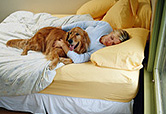
TUESDAY, April 15, 2014 (HealthDay News) — Children with autism may find the “unconditional” love of the family dog a real help, a small new study finds.
Researchers at the University of Missouri interviewed 70 parents of children with autism. The investigators found that nearly two-thirds owned dogs, and that 94 percent of those parents said their children formed a bond with their four-legged friend.
“Children with autism spectrum disorders often struggle with interacting with others, which can make it difficult for them to form friendships,” study lead author Gretchen Carlisle, a research fellow at the university’s Research Center for Human-Animal Interaction, said in a school news release.
“Children with autism may especially benefit from interacting with dogs, which can provide unconditional, nonjudgmental love and companionship to the children,” she added.
The advantages of having a dog include companionship, stress relief and giving children with autism opportunities to learn responsibility, according to the study published in a recent issue of the Journal of Pediatric Nursing.
Many of the parents in the study said they opted to get a dog because they believed it would help their child.
“Dogs can help children with autism by acting as a social lubricant,” Carlisle explained. “For example, children with autism may find it difficult to interact with other neighborhood children. If the children with autism invite their peers to play with their dogs, then the dogs can serve as bridges that help the children with autism communicate with their peers.”
However, Carlisle said it’s important to consider a child’s characteristics when selecting a dog in order to make sure the pet and child are a good match.
“Bringing a dog into any family is a big step, but for families of children with autism, getting a dog should be a decision that’s taken very seriously,” Carlisle said. “If a child with autism is sensitive to loud noises, choosing a dog that is likely to bark will not provide the best match for the child and the family. If the child has touch sensitivities, perhaps a dog with a softer coat, such as a poodle, would be better than a dog with a wiry or rough coat, such as a terrier.”
And, the researchers suggested, the child should be involved in the process of choosing a dog.
“Many children with autism know the qualities they want in a dog. If parents could involve their kids in choosing dogs for their families, it may be more likely the children will have positive experiences with the animals when they are brought home,” Carlisle said.
More information
The U.S. National Institute of Neurological Disorders and Stroke has more about autism.
Copyright © 2026 HealthDay. All rights reserved.

